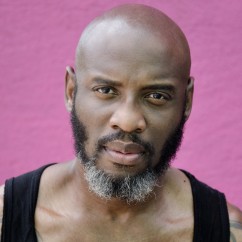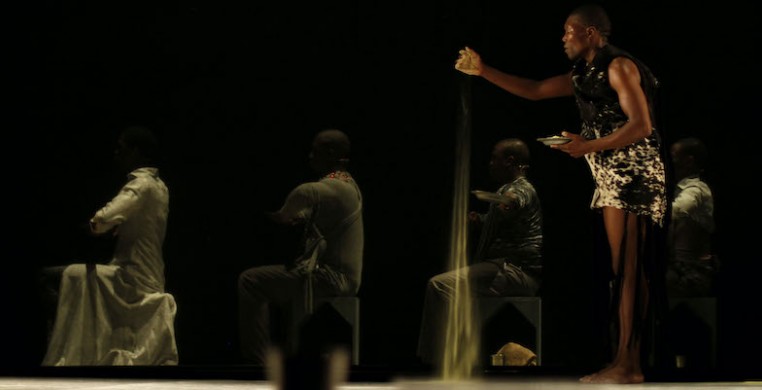I wish I was capable of telling the Black story, but it requires the translation of many tongues due to its complex histories and multiple traditions usually penned by others … those who othered us. Dances composed with Black bodies offer a plurality that should attach itself to dialogue with the dancers, the music and the audience, because the rubric for interpretation is never singular.
Premiered in 2012 at the Dance Umbrella in Johannesburg, Gregory Maqoma’s, “Exit/Exist” was featured as part of the JOMBA! "Legacy" program on the third day of the virtual festival. From my computer screen, words projected in French on the back wall of the theater provided historical contexts about Chief Maqoma, a 19th Century Xhosa warrior who fought against the British over cattle and land. Wearing a silver suit and with his back to the audience, Mr. Maqoma physicalized gestures which created their own music, supporting the strings of Giuliano Modarelli, whose artistic offering, along with that of an a capella quartet named Complete, was an invitation —a calling.
Mr. Maqoma is a transdisciplinary storyteller and movement linguist whose physical instrument speaks many languages. In “Exit/Exist,” Maqoma composed a host of events revealing ceremonial tasks like the sustained pouring of oil over his body and the familiar task of balancing a plate on his head—an act my Jamaican grandmother used to perform. Some of the tasks were illegible, but as the narrative abstractly lent itself to the life of Chief Maqoma, Mr. Maqoma embodied struggle, conflict, captivity and survival in ways one could successfully deduce.
Fourteen minutes into the hour long work, Mr. Maqoma painted the space, using his body as a brush to create circular patterns in the undulation of his spine and swift directional changes of his body’s guided momentum. From the carving action of his leg on the floor, lifting it as it reached behind him to rest in a bent knee position (a Eurocentric ballet translation as rond de jambe par terre into a back attitude), to placing weight on one bent leg after a series of continuous small turns (my colonized mind only saw châiné turns and a deep lunge), Mr. Maqoma never sacrificed the percussion of his feet, stomping to complete the polyrhythmic complexities audible when the voices of Complete, the stroking of Modarelli’s guitar and the gumboot sensibilities of Mr. Maqoma’s sole tapping feet intersect.
The title "Exit/Exist" lives as a paradox, serving as an elusive indication that we may have to leave our colonized bodies behind so as to survive in our altruistic realism. There is no doubt that the South African dance scene has been shaped by a multiplicity of cultures, influences and motivations, but at times during my screening of “Exit/Exist,” I yearned to find where the motivations of whiteness ended and where the decolonized Black body gets to exalt in all its own beauty. Rich and skillfully crafted, “Exit/Exist” shows Mr. Maqoma to be an adept collaborator and a true creative visionary.
--
This piece was produced as part of the inaugural See Chicago Dance Critical Writing Fellowship in partnership with JOMBA! Contemporary Dance Experience and the University of KwaZulu-Natal (Durban, South Africa), the University of the Witwatersrand and The Ar(t)chive (Johannesburg, South Africa) and the University of East London (London, UK). Financial support is provided by the U.S. Consulate in Durban, the National Endowment for the Arts and the Chicago Department of Cultural Affairs and Special Events.

Fellow Gregory King is a culturally-responsive educator, performance artist, activist and movement maker who received his MFA in choreographic practice and theory from Southern Methodist University, and is certified in Elementary Labanotation from the Dance Notation Bureau. His dance training began at the Washington Ballet and continued at American University and Dance Theatre of Harlem. He has participated in the Horton Project in conjunction with the Library of Congress and has performed with Rebecca Kelly Ballet, The Washington Ballet, Erick Hawkins Dance Company, New York Theatre Ballet, Donald Byrd /The Group, The Metropolitan Opera Ballet, New York City Opera and Disney’s The Lion King on Broadway.
As a choreographer his works have been commissioned by Transformer Station (Cleveland, OH), Georgian Court University (Lakewood, NY), Texas Ballet Theatre School (Dallas, TX), Indiana University (Bloomington, IN), The Ammerman Center for Arts and Technology 16 Biennial Symposium (New London, CT), Current Sessions (New York, NY) and SPACES Gallery (Cleveland, OH), and presented at Dixon Place (New York, NY), The Kennedy Center (Washington D.C.) and Playhouse Square (Cleveland, OH).
He has taught master classes, lectures, and workshops nationally and internationally. He has served as dance faculty for Texas Ballet Theatre and Boston Ballet, as well as visiting assistant professor of dance at Temple University and Swarthmore College.
King is a dance writer for The Dance Enthusiast, ThINKingDANCE, The Philadelphia Dance Journal, CHOICE Review and Broad Street Review. Recently, Mr. King’s response to the Dancing for Justice Philadelphia event and was cited in the U. S. Department of Arts and Culture’s new resource guide, “Art Became the Oxygen.”
In addition to having served on the dance review board for the National Endowment for the Arts, King was nominated for a Governor’s Award for the Arts in Ohio and was recently appointed to the Board of OhioDance. He was the 2018 recipient of the Outstanding Creative Contribution award from the Division of Diversity, Equity and Inclusion at Kent State University and served as Provost Faculty Associate for the academic year 2019-2020. Mr. King is a tenure track professor of dance at Kent State where he serves as the artistic director of the Kent Dance Ensemble. www.gregoryaking.com

